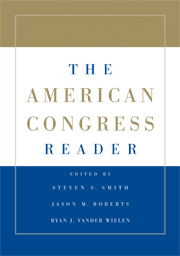Book contents
- Frontmatter
- Contents
- THE AMERICAN CONGRESS READER
- PART I THE AMERICAN CONGRESS: MODERN TRENDS
- PART II REPRESENTATION AND LAWMAKING IN CONGRESS: THE CONSTITUTIONAL AND HISTORICAL CONTEXT
- PART III CONGRESSIONAL ELECTIONS AND POLICY ALIGNMENTS
- PART IV MEMBERS, GOALS, RESOURCES, AND STRATEGIES
- PART V PARTIES AND LEADERS
- PART VI THE STANDING COMMITTEES
- PART VII THE RULES OF THE LEGISLATIVE GAME
- PART VIII THE FLOOR AND VOTING
- PART IX CONGRESS AND THE PRESIDENT
- 28 Presidential Veto Messages
- 29 Presidential Signing Statement
- 30 Veto Bargaining
- 31 The Dynamics of Legislative Gridlock, 1947–1996
- 32 The Politics of Shared Power
- 33 Conscience of a Conservative
- PART X CONGRESS AND THE COURTS
- PART XI CONGRESS, LOBBYISTS, AND INTEREST GROUPS
- PART XII CONGRESS AND BUDGET POLITICS
- PART XIII FURTHER READINGS ON CONGRESSIONAL POLITICS
28 - Presidential Veto Messages
Published online by Cambridge University Press: 05 June 2012
- Frontmatter
- Contents
- THE AMERICAN CONGRESS READER
- PART I THE AMERICAN CONGRESS: MODERN TRENDS
- PART II REPRESENTATION AND LAWMAKING IN CONGRESS: THE CONSTITUTIONAL AND HISTORICAL CONTEXT
- PART III CONGRESSIONAL ELECTIONS AND POLICY ALIGNMENTS
- PART IV MEMBERS, GOALS, RESOURCES, AND STRATEGIES
- PART V PARTIES AND LEADERS
- PART VI THE STANDING COMMITTEES
- PART VII THE RULES OF THE LEGISLATIVE GAME
- PART VIII THE FLOOR AND VOTING
- PART IX CONGRESS AND THE PRESIDENT
- 28 Presidential Veto Messages
- 29 Presidential Signing Statement
- 30 Veto Bargaining
- 31 The Dynamics of Legislative Gridlock, 1947–1996
- 32 The Politics of Shared Power
- 33 Conscience of a Conservative
- PART X CONGRESS AND THE COURTS
- PART XI CONGRESS, LOBBYISTS, AND INTEREST GROUPS
- PART XII CONGRESS AND BUDGET POLITICS
- PART XIII FURTHER READINGS ON CONGRESSIONAL POLITICS
Summary
In accordance with the Constitution, the president is to return a vetoed measure to the house of origin along with a veto message containing his objections. These veto messages offer Congress valuable insight into the president's logic for vetoing a given measure and occasionally spur Congress to re-pass the measure taking into account these objections. The veto messages here are the first three messages of President George W. Bush.
MESSAGE TO THE HOUSE OF REPRESENTATIVES
May 1, 2007
TO THE HOUSE OF REPRESENTATIVES:
I am returning herewith without my approval H.R. 1591, the “U.S. Troop Readiness, Veterans' Care, Katrina Recovery, and Iraq Accountability Appropriations Act, 2007.”
This legislation is objectionable because it would set an arbitrary date for beginning the withdrawal of American troops without regard to conditions on the ground; it would micromanage the commanders in the field by restricting their ability to direct the fight in Iraq; and it contains billions of dollars of spending and other provisions completely unrelated to the war.
Precipitous withdrawal from Iraq is not a plan to bring peace to the region or to make our people safer here at home. The mandated withdrawal in this bill could embolden our enemies – and confirm their belief that America will not stand behind its commitments. It could lead to a safe haven in Iraq for terrorism that could be used to attack America and freedom-loving people around the world, and is likely to unleash chaos in Iraq that could spread across the region.
- Type
- Chapter
- Information
- The American Congress Reader , pp. 319 - 321Publisher: Cambridge University PressPrint publication year: 2008



